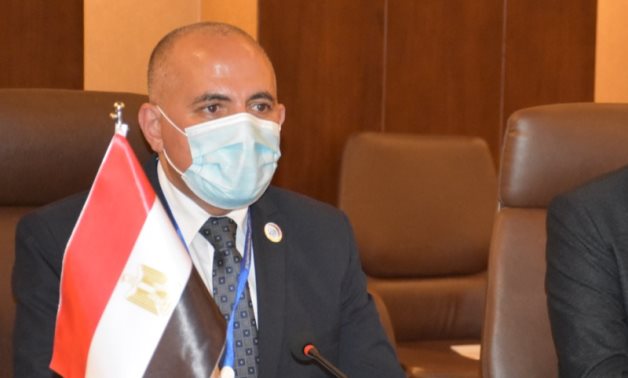
File- Egyptian Irrigation and Water Resources Minister Mohamed Abdel Atti during the 1st round of Baghdad International Water Conference- press photo
CAIRO – 2 July 2021: Egypt suffers from water scarcity, as its water resources are estimated at about 60 billion cubic meters annually, while the annual needs are estimated at about 114 billion cubic meters, said Egyptian Minister of Irrigation Mohamed Abdel Attai on Friday.
Abdel-Atti comments came in the virtual meeting of Bonn Water Dialogues for Results, which was organized by the German government. The comments also came two weeks ahead of the second phase of filling the controversial Grand Ethiopian Renaissance Dam (GERD) scheduled mid-July.
The gap between the needs and the consumption is being compensated by reusing agricultural drainage water and treating wastewater, besides 34 billion cubic meters of water annually taken from importing food products.
The Minister clarified that the water sector faces major challenges, atop of which is the limited water resources, besides the unilateral measures taken by the Ethiopian side regarding the filling and operation of the GERD and climate change and its negative impact.
Egypt has shown to in negotiating with Ethiopia, which responded with intransigence to prevent commitment to what was agreed upon, Abdel Atti said, noting that Egypt will not accept a unilateral act to fill and operate the Ethiopian dam.
Egypt is not against the development of any African country and has helped several Nile basin countries in building other dams.
Abdel Atti said that losing one billion cubic meters of water could force 200,000 families to lose their livelihood.
The three countries held several tripartite meetings since 2014 to reach a comprehensive agreement on the dam’s filling and operation. However, no final agreement has been reached yet and each party blames the other for the failure of the negotiations.
In mid-July 2020, Ethiopian authorities unilaterally carried out the first phase of the filling process with 4.9 billion cubic meters; and it is expected that the second phase of the filling would reach 13 billion cubic meters.
The dispute among Egypt, Sudan, and Ethiopia dates back to May 2011 when Ethiopia started building the dam; Egypt voiced concern over its water share [55.5 billion cubic meters].
In 2015, the three countries signed the Declaration of Principles, per which the downstream countries should not be negatively affected by the construction of the dam, whose capacity is 74 billion cubic meters and is planned to generate 6,000 megawatts per annum through 16 turbines.

Comments
Leave a Comment